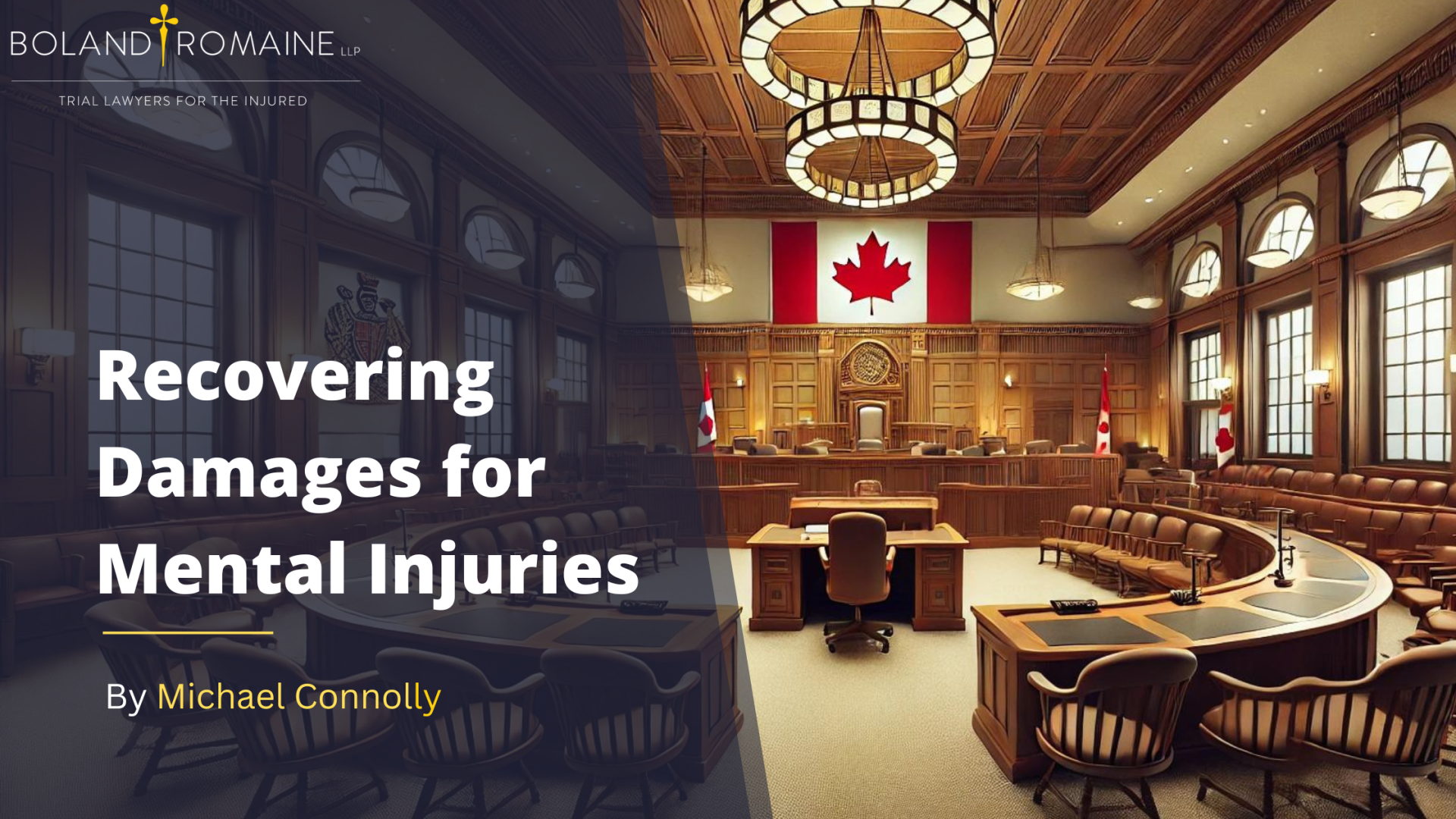Recovering Damages for Mental Injuries
- 20.09.2024
- Uncategorized

Traditionally, personal injury claims have focused primarily on physical harm, with clear legal frameworks in place for compensating visible injuries. However, the growing recognition of psychological injuries and their profound impact is leading to significant shifts in the legal landscape. Courts across the country are adapting to better address the challenges of compensating victims for mental and emotional trauma.
This blog explores the evolving legal complexities of recovering compensation for psychological injuries. We will examine how mental injuries are assessed, recent legal changes, and strategies for building a strong case for those affected by mental trauma due to another's negligence.
The Landmark Saadati v. Moorhead Case
A pivotal moment in Canadian law regarding mental injury claims occurred with the 2017 Saadati v. Moorhead case, where the Supreme Court of Canada broadened the scope for mental injury compensation. In this case, the Court ruled that a recognized psychiatric illness is not a requirement to claim damages for mental injury. Instead, claimants can rely on testimony—such as that from family and friends—to demonstrate how their personality or behavior has changed post-accident.
The decision clarified inconsistencies in decisions reached by lower courts regarding whether expert medical evidence was required to prove mental injury. By clarifying that there is no such requirement for expert medical evidence at trial, the ruling in Saadati v Moorhead makes it easier for plaintiffs suffering from mental trauma to seek justice, even without a formal psychiatric diagnosis.
Psychological injuries can include post traumatic stress disorder, chronic pain, or an emotional disorder involving symptoms of depression, stress, or anxiety that can interfere with your ability to function normally. While these types of injuries are interpreted on a case-by-case basis, the Courts recognize that legitimate psychological injuries suffered as a result of an act of negligence can occur and are compensable.
Common Psychological Injuries in Personal Injury Cases
Psychological injuries can be as debilitating as physical ones, often leaving long-term impacts on a person’s life and daily functioning. Unlike physical injuries, these mental scars are less visible but can take longer to heal. Recognizing the significance of these injuries is crucial for ensuring fair compensation. Common psychological injuries that courts have awarded damages for include:
- Post-Traumatic Stress Disorder (PTSD)
- Anxiety
- Depression
Depression
Depression is a mental health condition that affects how a person feels, thinks, and behaves, often resulting from traumatic events like accidents. After such incidents, individuals may experience feelings of grief over the loss of their pre-accident lifestyle. Common symptoms include persistent sadness, loss of interest in previously enjoyed activities, changes in appetite and sleep patterns, fatigue, feelings of worthlessness, difficulty concentrating, and even thoughts of suicide. These symptoms must last for at least two weeks to be considered clinical depression. Fortunately, depression may be treatable through therapy, medication, or lifestyle changes like regular exercise and a healthy diet.
Anxiety
Anxiety, a common response to stress, can become problematic when it is excessive and disproportionate to the situation, potentially leading to an anxiety disorder. People may begin avoiding activities like work or social interactions. For instance, following a car accident, some individuals develop driving anxiety, an overwhelming fear of driving that is out of proportion to the actual risk involved. This fear can cause significant distress and lead to avoidance behaviors. Treatment for anxiety often involves therapy, medication, and lifestyle adjustments to manage symptoms.
Post-Traumatic Stress Disorder (PTSD)
PTSD is a condition that develops after witnessing or experiencing a traumatic event. It manifests through recurring, distressing thoughts or flashbacks of the event, avoidance of reminders, and intense mood disturbances such as anger, detachment, and difficulty concentrating. To be diagnosed, these symptoms must persist for over a month and disrupt daily functioning. Like depression and anxiety, PTSD is treated with therapy, medication, or a combination of both.
The Role of Expert Evidence
While expert evidence is not strictly necessary to prove mental injury, as highlighted in Saadati v. Moorhead, it can strengthen a claimant’s case. Courts often consider the severity and duration of impairments in cognitive functioning, participation in daily activities, and the effectiveness of treatment when determining mental injury. In cases like Bothwell, the absence of expert evidence can weaken a claim, making it harder to prove that psychological upset crosses into compensable injury.
Psychological Injuries Lawyer Toronto
Physical injuries as a result of an accident can have mental health consequences due to loss of work, inability to partake in activities that the victim enjoyed before the injury, dealing with pain, lifestyle changes, and more. Not being able to live your typical lifestyle affects your physical health and can also seriously affect your mental health.
Boland Romaine personal injury lawyers will examine every aspect of the case and work with an experienced team of medical professionals to obtain the information and insight necessary to secure a successful post-injury settlement or trial verdict.




